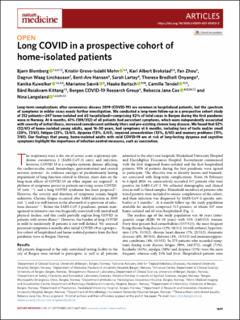Long COVID in a prospective cohort of home-isolated patients
Blomberg, Bjørn; Mohn, Kristin Greve-Isdahl; Brokstad, Karl Albert; Zhou, Fan; Linchausen, Dagrunn Waag; Hansen, Bernt-Are; Jalloh, Sarah Larteley Lartey; Onyango, Therese Bredholt; Kuwelker, Kanika; Sævik, Marianne; Bartsch, Hauke; Tøndel, Camilla; Kittang, Bård Reiakvam; Cox, Rebecca Jane; Langeland, Nina
Journal article, Peer reviewed
Published version

Åpne
Permanent lenke
https://hdl.handle.net/11250/2783660Utgivelsesdato
2021Metadata
Vis full innførselSamlinger
- Department of Clinical Science [2318]
- Registrations from Cristin [9791]
Sammendrag
Long-term complications after coronavirus disease 2019 (COVID-19) are common in hospitalized patients, but the spectrum of symptoms in milder cases needs further investigation. We conducted a long-term follow-up in a prospective cohort study of 312 patients—247 home-isolated and 65 hospitalized—comprising 82% of total cases in Bergen during the first pandemic wave in Norway. At 6 months, 61% (189/312) of all patients had persistent symptoms, which were independently associated with severity of initial illness, increased convalescent antibody titers and pre-existing chronic lung disease. We found that 52% (32/61) of home-isolated young adults, aged 16–30 years, had symptoms at 6 months, including loss of taste and/or smell (28%, 17/61), fatigue (21%, 13/61), dyspnea (13%, 8/61), impaired concentration (13%, 8/61) and memory problems (11%, 7/61). Our findings that young, home-isolated adults with mild COVID-19 are at risk of long-lasting dyspnea and cognitive symptoms highlight the importance of infection control measures, such as vaccination.
